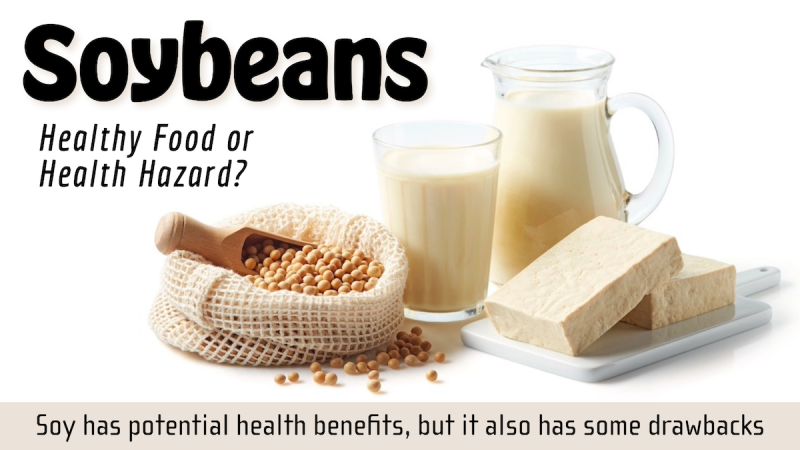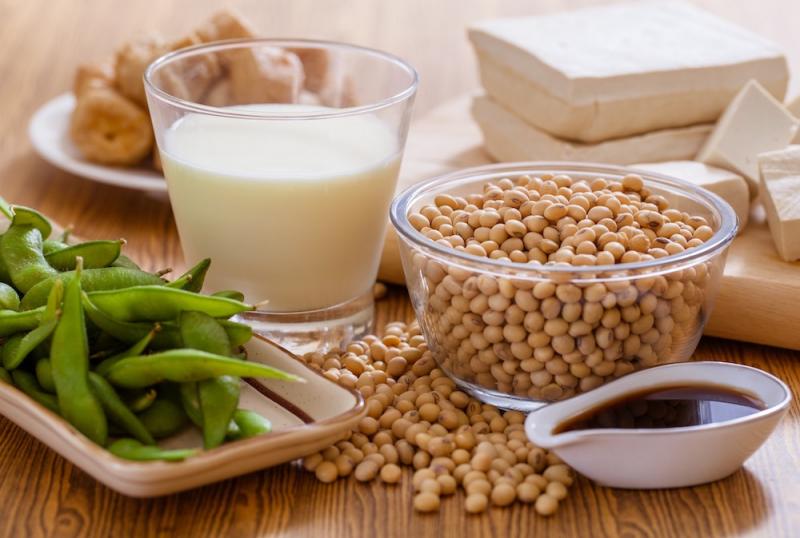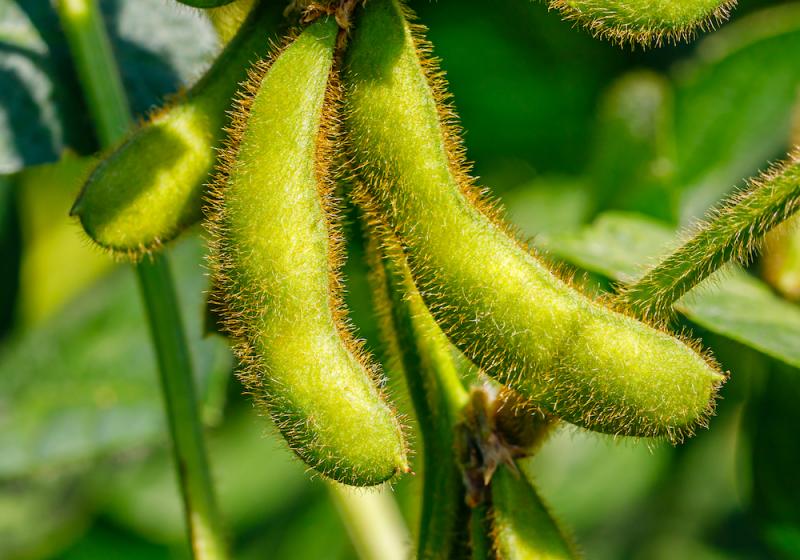
Soybeans are commonly used as a source of vegetable protein. Soy is used to make soy milk, tofu, and many meat alternatives. It’s also used to make products like miso, tamari, natto, and tempeh.
Soy is widely promoted as a health food, but there are pros and cons to eating soy. I’ll explain the benefits of soy and the best way to get them later in this article, but first I want to address the problems associated with soybeans as a food and medicine. First, most soybeans today are genetically modified, which also means that non-organic soy has probably been heavily sprayed with glyphosate herbicides. Secondly, soybeans share the same problem as all beans and grains. They contain trypsin inhibitors that inhibit protein digestion and phytic acid which reduces the absorption of minerals like calcium, magnesium, iron, and zinc.
These problems are overcome by only purchasing organic soy products and fermented soy products, as fermentation breaks down the chemicals that inhibit digestion and mineral absorption. However, some people have allergies to soy and will have to avoid it period.
Soy, Phytoestrogens, and Menopause
I believe that soy can be helpful for women going through the menopause. My wife has been experiencing symptoms of perimenopause, the period just before full cessation of periods. She’s also developed a craving for Asian food, including soy-based foods like tofu and miso. They seem to agree with her.
This makes sense since soy is high in phytoestrogens. Women who have more phytoestrogens in their diet may experience fewer symptoms during menopause including fewer or less intense hot flashes. Of course, soy is not the only food here that can help. Other foods that are sources of phytoestrogens and may be helpful during perimenopause and menopause include garbanzo beans (chickpeas), flax seeds, and dried fruits.
My Experiences with Soy
 I find soy products don’t agree with me, except in small quantities. This is in spite of the fact that the blood type diet suggests that soy is a beneficial food for me because I'm blood type A. This means it’s supposed to be good for me, but as I always teach people, it’s more important to pay attention to what your body is telling you than what is supposed to be good.
I find soy products don’t agree with me, except in small quantities. This is in spite of the fact that the blood type diet suggests that soy is a beneficial food for me because I'm blood type A. This means it’s supposed to be good for me, but as I always teach people, it’s more important to pay attention to what your body is telling you than what is supposed to be good.
I made this connection while sampling soy products at Expo West in Anaheim. I went to this expo for health food store products every spring for many years and one of my favorite things to do was to sample all the food products.
During the first couple of years, I’d experience some digestive upset doing this. I thought it was due to mixing too many types of foods, but, then I started to link it to the soy products. When I started avoiding all the vegetarian protein foods based on soy, I stopped having digestive issues while sampling the food. I’ve experienced similar issues with soy milk and soy protein powders. My body simply doesn’t tolerate them.
Potential Problems with Soy
 Whether soy is good for men, at least in large quantities, is disputed. Mainstream sources tend to say that there’s no harm in men eating soy as a health food, but many athletes found soy powders interfered with muscle building and the Weston A. Price Foundation has published information about the negative effects of soybeans on men. The following comes from their article Myths and Truths About Soy.
Whether soy is good for men, at least in large quantities, is disputed. Mainstream sources tend to say that there’s no harm in men eating soy as a health food, but many athletes found soy powders interfered with muscle building and the Weston A. Price Foundation has published information about the negative effects of soybeans on men. The following comes from their article Myths and Truths About Soy.
The soy isoflavones, which are the phytoestrogen compounds in soy, have been reported to cause infertility in animals. Soy can prevent ovulation and may contribute to girls starting puberty at younger ages. The article also reports that Japanese housewives feed tofu to their husbands frequently when they want to reduce his sex drive.
According to the Weston Price Foundation, soy isoflavones also have a thyroid-inhibiting effect. They say, “Eating as little as 30 grams (about 4 tablespoons) of soy per day can result in hypothyroidism with symptoms of lethargy, constipation, weight gain, and fatigue.”
Fermented Soy Products are the Best
 The Chinese learned to ferment soybeans to make foods like tempeh, natto, and tamari. I think these fermented soy products are probably the healthiest way to eat soy. In the book Chinese Medical Herbology and Pharmacology fermented soy is listed as acrid, sweet, slightly bitter, and cooling. It says that the gentle action of the remedy “makes it suitable for irritability or exterior syndromes in chronic, deficient, or elderly patients.” It clears damp heat and raises the yang qi.
The Chinese learned to ferment soybeans to make foods like tempeh, natto, and tamari. I think these fermented soy products are probably the healthiest way to eat soy. In the book Chinese Medical Herbology and Pharmacology fermented soy is listed as acrid, sweet, slightly bitter, and cooling. It says that the gentle action of the remedy “makes it suitable for irritability or exterior syndromes in chronic, deficient, or elderly patients.” It clears damp heat and raises the yang qi.
So, you will probably get the best health benefits from soy if you eat fermented soy products such as natto, miso, and tempeh. I found a review of the scientific literature on this topic on PubMed, Fermented Soy Products and Their Potential Health Benefits: A Review. The article stated the following in its abstract. “The inclusion of these foods in the diet has been associated with the reduction of chronic diseases, with potential anticancer, anti-obesity, antidiabetic, anticholesterol, anti-inflammatory, and neuroprotective effects.”
There are probably specific health benefits to different forms of fermented soy, too. For instance, natto is a source of enzymes called nattozymes that help to inhibit thrombosis. These enzymes are also available in supplement form.
Using Soy as a Food and Medicine
I think small amounts of soy products in the diet are fine for most people unless they have a specific allergy to it. However, to avoid the GMO soybeans and the glyphosate herbicide in them I’d purchase only organic soy products. To avoid the phytic acid and trypsin inhibitors that interfere with protein digestion and mineral absorption I’d also choose fermented soy products over soy protein isolates.
Reasons to consume these foods would include trying to reduce chronic inflammation (fermented soy is a cooling food in TCM) and oxidative stress. Eating these soy foods may also reduce your risk of cancer and diabetes, and be a beneficial food when you’re older and have difficulty digesting animal proteins. I’d also recommend these foods to women who have PMS type D (low estrogen) or who are entering or going through menopause.
Reasons to avoid soy would include low thyroid, problems with infertility, or experience indigestion when eating them. For women, I’d recommend avoiding soy products if you’re already suffering from the estrogen dominance (excess estrogen) associated with PMS type A. For men with low testosterone or are past andropause, I'd recommend avoiding them in general. Otherwise, some consumption of soy products should be alright.
Steven's Articles
-

-
Eucommia Bark
A superior tonic that promotes kidney, structural,…
January
-

-
Goldenthread, Phellodendron, and Yellow Root
Three herbal remedies containing the infection-fighting…
-

-
Teasel
A traditional herb for healing bones and joints…
-

-
Barberry and Healthy Personal Boundaries
A thorny shrub for fighting infections and supporting…
December
-

-
The Evidence for Berberine
A yellow alkaloid found in traditional infection-fighting…
-

-
The Sensible Use of Caffeinated Herbs
Kola nuts, guarana, and yerba mate and other herbs…
-

-
The Health Benefits and Problems with Coffee
This popular caffeinated beverage can be beneficial…
October
-

-
Understanding Caffeine & Cellular Adaptation
Preserving the power of caffeine's buzz and the…
September
-

-
Horseradish
A pungent spice for aiding protein metabolism…
-

-
Banaba or Crepe Myrtle
A beautiful tree from Southeast Asia whose leaves…
August
-

-
Monkeyflowers
Flower essences to help see ourselves more clearly…
-

-
Mariposa Lilies
Strengthening the bond between mother and child…
-

-
The Noble Bay Leaf
A common kitchen herb for aiding digestion and…
-

-
Epimedium: Horny Goat Weed
A circulatory stimulant and kidney yang tonic…
July
-

-
The Medicinal and Nutritional Benefits of Apricots
A nutritious fruit and valuable medicinal seed for coughs

